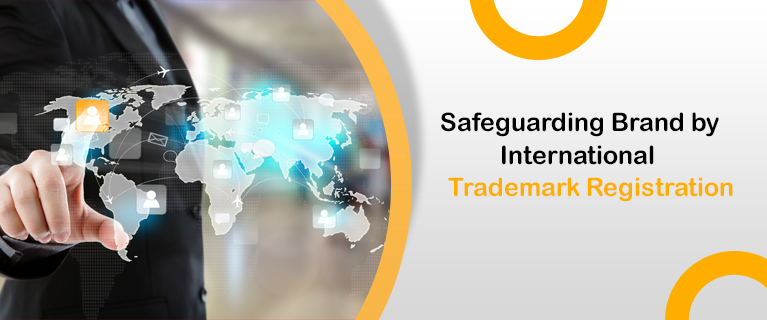In today’s rapidly evolving global economy, the imperative to safeguard your brand has never been more pronounced. With businesses extending their reach across borders, the significance of securing a globally recognized trademark cannot be overstated. In this comprehensive guide, we delve into the multifaceted importance of international trademark registration and elucidate why it should rank as a top priority for enterprises seeking to fortify their brand presence worldwide.
Understanding International Trademark Registration:
International trademark Registration entails securing protection for your brand across multiple countries where it is registered. This protection extends to various elements such as company names, logos, slogans, product designs, or any distinctive identifiers associated with your products or services.
At the heart of every successful business lies its brand identity. It encapsulates not only the products or services offered but also the values, ethos, and reputation that define the organisation. As companies expand beyond their domestic markets, they inevitably encounter diverse legal landscapes, cultural nuances, and competitive dynamics. Amidst this complexity, a robust trademark strategy serves as a linchpin for brand protection and differentiation.
Read also this -: A Comprehensive Guide to Global Trademark Registration
The Madrid Protocol: Simplifying Global Trademark Registration
When considering trademark registration, businesses encounter two primary options: national registration and international registration. National registration involves filing for trademark protection individually in each country where you seek registration, a process that can be arduous and expensive due to the need for separate applications in each jurisdiction.
Enter the Madrid Protocol, a procedural treaty administered by the World Intellectual Property Organization (WIPO)’s International Bureau. This protocol revolutionizes the trademark registration process by allowing companies to file a single application that covers multiple countries simultaneously. By streamlining the process and minimizing costs associated with filing multiple applications, the Madrid Protocol emerges as an invaluable tool for businesses seeking global trademark protection.
Benefits of International Trademark Registration:
One of the foremost reasons for pursuing international trademark registration is the need for legal certainty and protection. Trademarks serve as exclusive identifiers, distinguishing goods and services from those of competitors while signalling quality and trust to consumers. Without adequate protection, businesses risk falling prey to counterfeiters, infringers, or opportunistic competitors seeking to capitalize on their brand equity.
Moreover, in today’s digital age, the virtual realm knows no boundaries. The proliferation of e-commerce platforms, social media channels, and online marketplaces has exponentially expanded the avenues for brand exposure – and vulnerability. International trademark registration empowers businesses to assert their rights in the digital sphere, mitigating the risk of brand dilution, cybersquatting, or unauthorized use across global markets.
Furthermore, international trademark registration facilitates market entry and expansion strategies. It provides a solid foundation for building brand equity and instills confidence among investors, partners, and consumers alike. Whether pursuing joint ventures, franchising agreements, or cross-border collaborations, a registered trademark signals commitment, legitimacy, and accountability in the eyes of stakeholders.
Beyond legal protection and market access, international trademark registration fosters strategic agility and adaptability. It enables businesses to anticipate and navigate the evolving landscape of intellectual property (IP) rights, regulatory frameworks, and commercial trends across jurisdictions. By proactively securing trademark rights in key markets, organizations can preempt disputes, streamline enforcement efforts, and optimize their brand strategy for sustained growth and resilience.
1. Legal Protection Against Misuse and Competition: International Trademark Registration provides businesses with robust legal protection against unauthorized use of their brand identity and potential competition in various jurisdictions across the globe. When a company registers its trademark internationally, it gains exclusive rights to use that mark in the designated territories. This means that competitors cannot use similar marks that might confuse consumers or dilute the original brand’s reputation. For example, if a company acquires Trademark Registration in the USA, it doesn’t automatically protect the brand in other countries. However, through International trademark registration, businesses can safeguard their brand from infringement and unauthorized use on a global scale, reducing the risk of brand confusion and damage.
2. Building Trust Among Customers: International trademark registration demonstrates a company’s commitment to protecting its brand identity and reputation worldwide. When consumers see that a brand has taken the necessary steps to secure its trademarks internationally, it signals legitimacy and reliability. Consumers are more likely to trust brands that invest in protecting their intellectual property rights, as it shows a dedication to maintaining consistent quality and authenticity. This trust is crucial for businesses to retain loyal customers and attract new ones in competitive global markets.
Read also this -: A Comprehensive Guide On International Trademark Registration
3. Enhancing Business Value: A strong trademark enhances the overall value of a business by distinguishing its products or services from competitors and creating brand recognition. When a trademark is registered internationally, it signifies global recognition and protection, which adds tangible value to the company’s assets. Potential buyers or investors are more inclined to invest in or acquire businesses with internationally recognized trademarks because they come with built-in brand equity and market presence. This can lead to higher acquisition offers or investment opportunities, ultimately contributing to the company’s growth and success.
4. Expanding Business Opportunities: International trademark registration not only protects intellectual property but also opens up a multitude of business opportunities, such as licensing agreements and partnerships. With a registered trademark, businesses can grant licenses to third parties to use their brand in different markets or product categories, generating additional revenue streams. Furthermore, having a globally recognized trademark makes it easier to form partnerships with other businesses, expand into new markets, and reach a broader customer base. These opportunities for collaboration and expansion can drive revenue growth and solidify the brand’s position in the global marketplace.
5. Mitigating Litigation Risks: Proactive trademark registration helps businesses mitigate the risk of costly and time-consuming legal battles by preemptively protecting their brand against infringement. By registering trademarks internationally, companies establish a clear legal framework for protecting their intellectual property rights in multiple jurisdictions. This reduces the likelihood of disputes with competitors over brand ownership or misuse, saving the company valuable time and resources that would otherwise be spent on litigation. Additionally, having registered trademarks strengthens the company’s position in any legal proceedings, making it easier to enforce its rights and defend against infringement claims. Overall, international trademark registration serves as a proactive measure to minimize legal risks and safeguard the brand’s integrity and reputation.
Lessons from Past Mistakes:
History serves as a stark reminder of the importance of maintaining a global perspective when registering trademarks. Several prominent brands have faced costly repercussions due to inadequate international trademark protection:
Bosch Siemens: A trademark dispute between Chinese corporation Hisense and German conglomerate Bosch Siemens underscored the ramifications of failing to secure international trademark registration. Hisense’s preemptive registration in China led to a protracted legal battle, highlighting the significance of early global trademark protection.
Kodak: The iconic photography company’s failure to register its trademark expediently resulted in widespread confusion among consumers, eroding its market leadership position. This cautionary tale underscores the necessity of timely trademark registration to preserve brand distinctiveness.
Burger King: In Australia, Burger King’s inability to secure its trademark before a local competitor led to a rebranding debacle, causing significant brand dilution and market share loss. This example underscores the critical importance of proactive trademark registration to preempt potential conflicts.
Choose TrademarkCart for Seamless Trademark Registration:
When embarking on the journey of trademark registration, entrusting the process to a reputable partner is paramount. TrademarkCart emerges as a trusted ally, offering comprehensive services tailored to meet your trademark registration needs.
Why Choose TrademarkCart?
Choosing TrademarkCart offers several compelling benefits for businesses seeking trademark registration:
1. Expertise: TrademarkCart boasts a team of seasoned professionals with extensive knowledge of trademark laws and regulations. This expertise ensures that the trademark registration process is handled with meticulous attention to detail, minimizing the risk of errors or omissions that could delay or jeopardize the registration.
2. Global Reach: With the ability to serve clients worldwide, TrademarkCart facilitates trademark registration across diverse jurisdictions. Whether clients need Trademark Registration in USA, Trademark Registration in Singapore, Trademark Registration in Canada, or any other country, TrademarkCart’s global reach ensures seamless registration regardless of geographic location.
3. Streamlined Process: TrademarkCart leverages cutting-edge technology and industry expertise to streamline the trademark registration process. By automating certain aspects and employing efficient workflows, TrademarkCart saves clients time and resources, allowing them to focus on running their business while their trademark registration is in capable hands.
4. Comprehensive Services: TrademarkCart offers end-to-end solutions for trademark registration, including trademark searches, application filing, and post-registration maintenance. By providing comprehensive services, TrademarkCart ensures that clients have everything they need to protect their brand’s integrity throughout the registration process and beyond.
5. Client-Centric Approach: Above all, TrademarkCart prioritizes client satisfaction. With a client-centric approach, TrademarkCart emphasizes transparency, communication, and efficiency at every stage of the trademark registration process. By keeping clients informed and engaged throughout the process, TrademarkCart ensures a seamless experience from initiation to registration, fostering trust and confidence in its services.
Read also this -: How to Register a Trademark Internationally
Conclusion
International trademark registration serves as a linchpin in safeguarding brand value and ensuring sustained growth in today’s global marketplace. By leveraging the Madrid Protocol and partnering with trusted allies like TrademarkCart, businesses can fortify their brand presence, mitigate risks, and capitalize on lucrative opportunities across borders.
In essence, international trademark registration transcends mere legal compliance; it embodies a strategic imperative for businesses navigating the complexities of globalization. By safeguarding their brand assets proactively and comprehensively, enterprises can fortify their competitive advantage, cultivate customer loyalty, and unlock new opportunities in the global marketplace. In the subsequent sections of this guide, we will explore in greater depth the process, benefits, and best practices associated with international trademark registration.


